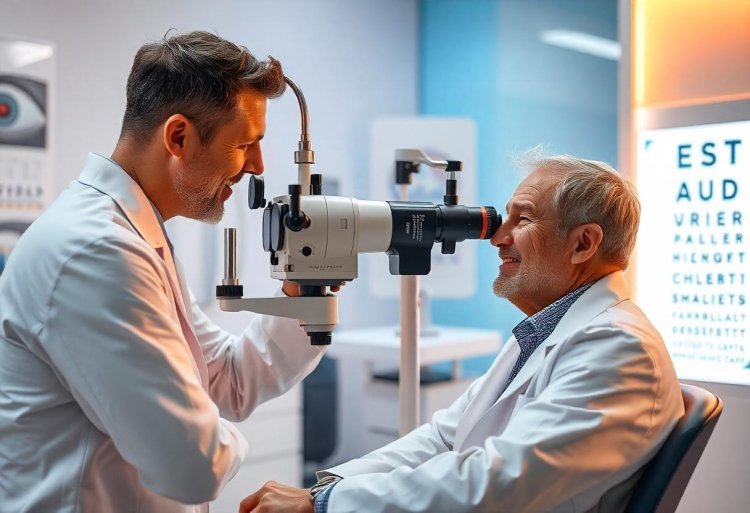How to Recognize Early Signs of Eye Health Issues
Learn early signs of eye health issues & when to visit an optometrist in Cedar Park. Protect your vision with expert tips on eye care

Although eye health is essential for general wellbeing, it is frequently ignored until serious issues occur. Early detection of possible issues with eye health can result in swift action, potentially preserving a person's vision. This article examines the typical early warning signs of eye health problems and offers advice on when to think about visiting an optometrist in Cedar Park. By being aware of these signs, you can keep your vision healthy and, if needed, get help from a doctor optometrist cedar park.
Key Points:
- Understanding typical early indicators of eye health problems
- Be aware of the risk factors for eye conditions
- Possible actions to keep your eyes healthy
- When to get eye care from a professional
Common Early Signs of Eye Health Issues
The onset of eye problems can be detected through a number of signs. Knowing these may help you in identifying and resolving problems at an early stage.
Vision Changes
Any change in vision, no matter how gradual or sudden, needs to be taken seriously. Blurring, double vision, or the abrupt emergence of floaters and light flashes are examples of this. These changes may be a sign of a detached retina, glaucoma, or retinal degeneration.
Physical Changes to the Eye
In addition, physical changes in the way your eyes seem can suggest deeper medical issues. Eyes that are too wet or dry, as well as redness and swelling, may be signs of autoimmune illness or infections. An eye care specialist should also assess any obvious shifts in eye position or eyelash position.
Eye Pain or Discomfort
Even though random eye pain might not necessarily point to something serious, severe or constant discomfort may be cause for concern. Deep eye difficulty, nausea, and vision defects are all symptoms of conditions like glaucoma requiring rapid medical attention.
Understanding Risk Factors
You can assess your personal risk and take steps to avoid it if you are aware of the risk factors linked to various eye diseases.
Age
The chance of getting eye conditions like glaucoma, cataracts, and AMD rises significantly with age.
Genetics
The health of the eyes is greatly affected by family history. Regular eye exams are even more important if you have a family history that increases your chance to get certain eye conditions.
Lifestyle Choices
The risk of eye health problems might be raised by factors such as smoking, eating poorly, and not moving. On the other hand, maintaining eye health can be done by avoiding smoking, eating a diet high in vitamins and omega-3 fats, and wearing sunglasses to protect against UV rays.
Maintaining Healthy Vision
Periodic eye exams and an embrace of lifestyle choices that promote eye health are crucial for maintaining good eyesight.
Regular Eye Exams
Making a visit to an eye care specialist on a frequent basis is essential, particularly if you have a high risk for getting eye conditions. These exams can catch issues before they progress and ensure that any necessary treatments are as effective as possible.
Protective Measures
Wearing the right eyewear is vital for protecting your eyes from harsh sunlight and mechanical injuries. In addition, make sure your workspace is set up properly to avoid eye strain.
When to Seek Professional Eye Care
By learning when to get expert eye care, you can stop harmful eye health problems from growing worse.
Symptoms That Require Immediate Attention
It's critical to get medical care right away if you experience double vision, chronic pain, or sudden vision loss. These signs may point to serious conditions that need to be managed right once.
Regular Check-Ups
Periodic exams are crucial even when there are no symptoms, especially for people over 40 or those with a family history of eye problems.
FAQs About Eye Health
Which foods are ideal for maintaining your eyes healthy?
Foods high in the fatty acids omega-3, zinc, lutein, zeaxanthin, and vitamins C and E are excellent for eye health. Fruits from citrus, fish, eggs, green leafy vegetables, and nuts are just a few examples.
How often should I get my eyes examined?
According to their age, risk factors, and whether they presently wear glasses or contact lenses, adults should get a thorough eye checkup every one to two years.
Can altering one's lifestyle lower one's chance of eye diseases?
Yes, you can significantly reduce your risk of getting eye disorders through making lifestyle changes including stopping smoking, eating a healthy diet, moving frequently, and protecting your eyes from UV rays.
What's Your Reaction?











